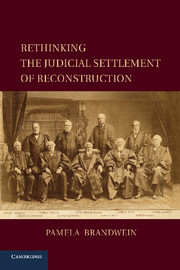Book contents
- Frontmatter
- Contents
- Acknowledgments
- 1 Abandoned Blacks?
- 2 The Emergence of the Concept of State Neglect, 1867–1873
- 3 The Civil/Social Distinction
- 4 The Birth of State Action Doctrine, 1874–1876
- 5 A Surviving Sectional Context, 1876–1891
- 6 The Civil Rights Cases and the Language of State Neglect
- 7 Definitive Judicial Abandonment, 1896–1906
- 8 Twentieth-Century Receptions
- 9 Conclusion
- Bibliography
- Index
9 - Conclusion
Published online by Cambridge University Press: 03 May 2011
- Frontmatter
- Contents
- Acknowledgments
- 1 Abandoned Blacks?
- 2 The Emergence of the Concept of State Neglect, 1867–1873
- 3 The Civil/Social Distinction
- 4 The Birth of State Action Doctrine, 1874–1876
- 5 A Surviving Sectional Context, 1876–1891
- 6 The Civil Rights Cases and the Language of State Neglect
- 7 Definitive Judicial Abandonment, 1896–1906
- 8 Twentieth-Century Receptions
- 9 Conclusion
- Bibliography
- Index
Summary
I want to end by offering some brief comments and cautions about the applicability of Waite-era legal concepts to current constitutional disputes. I want first to reiterate, in no uncertain terms, that no originalist assumptions reside here. My goal has been to supply a better account of constitutional development during the Reconstruction and post-Reconstruction eras and to examine the legal and political dimensions of Supreme Court decision making at this time. I have also tried to underscore how possibilities for argumentation have been opened up or closed down by historical processes. Such arguments create space for analytic reason to enter Fourteenth Amendment jurisprudence but the creation of such space has not been my driving objective.
The recovery of the concept of state neglect opens avenues for precedent-based argumentation in constitutional law today, but the concept was undertheorized and underelaborated. While Justice Bradley outlined the basic structure of the concept of state neglect, neither he nor anybody else provided answers to a number of critical questions: By what criteria was state neglect to be established? How were actions “on account of race” to be determined? Did state duties evolve, and how might new duties become established? Could the concept of state neglect be extended to cover other status-based failures? These are open questions that history cannot answer.
- Type
- Chapter
- Information
- Rethinking the Judicial Settlement of Reconstruction , pp. 240 - 244Publisher: Cambridge University PressPrint publication year: 2011



